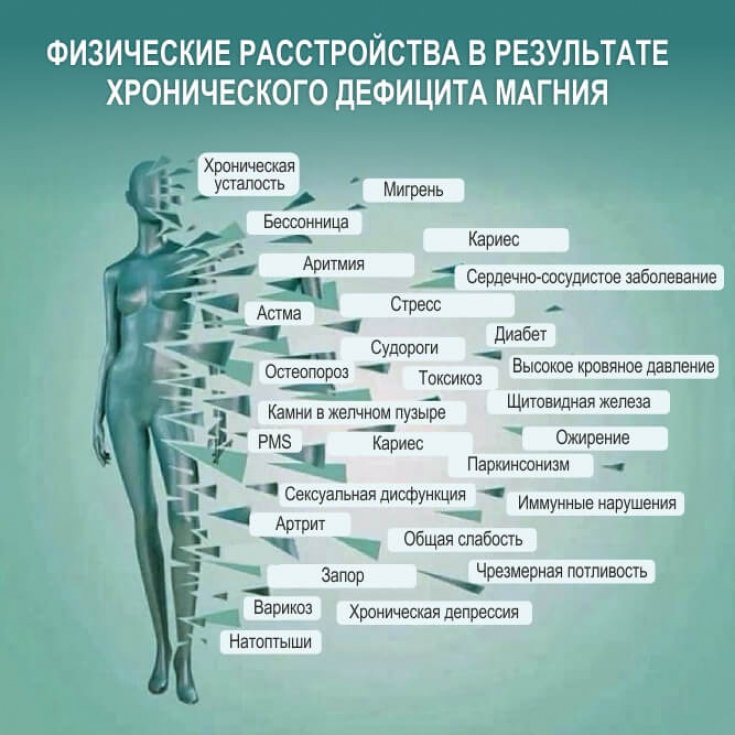Everyone knows about the importance of trace elements for maintaining the body in a healthy state. Each of us will offhand name a few of the most famous of them – say, calcium to strengthen bones or iron, which takes part in the processes of hematopoiesis.
Estet-portal.com found out that not everyone will remember magnesium, although this essential trace element is necessary for most biochemical processes occurring in the body, and it plays a key role in strengthening women's health.
- What is the biological role of magnesium
- The place of magnesium in the treatment of gynecological diseases
What is the biological role of magnesium
Magnesium — one of the most important trace elements, which occupies the second place in terms of content in the cell after potassium. The biological role of magnesium is multifaceted, since it is an essential element of many biochemical processes. Magnesium takes an active part in the process of neuromuscular excitability and affects the processes of thermoregulation of the body.
Read also: Acute cystitis: a common female problem
Magnesium is indispensable in carbohydrate, protein and lipid metabolism, nucleic acid synthesis, there are at least 500 magnesium-dependent proteins in the human body. It is involved in maintaining the normal function of the nervous and cardiovascular systems. The effect of magnesium on the cardiovascular system is twofold: participation in the process of blood coagulation as an antithrombotic factor and a direct effect on the heart muscle, since it is a powerful vasodilator, stabilizing the work of calcium channels and the rhythm of myocardial contractions.
Subscribe to our page on Facebook!

The role of magnesium in osteogenesis is known, since it maintains a normal level of calcium in the bones, which is essential for the stabilization of energy processes in bone tissue.
The most important causes of magnesium deficiency are:
- Reduced magnesium intake: reduced content in "civilized food", diet courses, alcoholism.
- Reduced intestinal resorption: prolonged diarrhoea, malabsorption syndrome, inflammatory enteropathies, decreased resorption due to high protein intake, high fat diet, high alcohol intake.
- Increased need for magnesium: pregnancy and lactation, increased physical activity (sweating), growth period, recovery period, stress.
- Increased magnesium excretion: gastrointestinal disorders — vomiting, prolonged diarrhea, abuse of laxatives; kidney disease, chronic alcoholism, diabetes mellitus, diuretic and cytostatic therapy, anti-tuberculosis drugs.
- Endocrine disorders.
In recent years, the frequency of detecting magnesium-deficient conditions among people with various diseases and conditions has been increasing in the world, which proves its connection with a wide range of diseases and pathological conditions associated with metabolic and hypertensive syndromes, connective tissue pathology, premenstrual and menopausal syndrome , Immune problems.
The place of magnesium in the treatment of gynecological diseases
Magnesium preparations have found their wide application in the treatment of various gynecological pathologies: premenstrual syndrome with a predominance of psycho-emotional stress (depression, irritability, swelling, soreness and a feeling of breast engorgement). The duration of therapy should be at least 2-3 menstrual cycles and can be continued for much longer.
Given that a magnesium-deficient state is accompanied by increased production of pro-inflammatory cytokines, the inclusion of magnesium preparations in the complex therapy of inflammatory diseases of the genital organs is very reasonable.
Read also: Hyperuricemia: elevated uric acid levels, what threatens
Magnesium deficiency in the body leads to a decrease in the activity of hyaluron synthetase, an increase in the activity of hyaluronidase, which leads to a violation of the metabolism of the gel-like medium of the extracellular matrix, accelerated aging of fibroblasts, slowing down the synthesis of collagen and elastin fibers and deterioration of the mechanical characteristics of the tissue. The inclusion of magnesium preparations in the complex of therapeutic measures is pathogenetically indicated for patients with genital prolapse, especially in the prevention of relapses after surgery.
One of the most common causes of menstrual and reproductive disorders against the background of progressive obesity is metabolic syndrome, a particular manifestation of which is polycystic ovary syndrome. Patients with metabolic syndrome have menstrual irregularities of the type of hypomenstrual syndrome up to amenorrhea, infertility, miscarriage, excessive hair growth, obesity.
Read also: Endometrial hyperplasia in menopause – important to know
Magnesium is known to be required for adequate glucose utilization and insulin signaling. The severity of the manifestations of the metabolic syndrome, including the level of insulin, is inversely proportional to the level of magnesium intake with food. Non-insulin-dependent diabetes mellitus is the result of long-term metabolic disorders that are inextricably linked with chronic magnesium deficiency. Serum magnesium levels in diabetic women are negatively correlated with blood lipids and body fat. At earlier stages of the formation of these disorders, asthenia often develops in patients, exacerbating already existing metabolic disorders.
In recent years, it has been established that the symptoms of menopausal syndrome are similar to those of magnesium deficiency: hot flashes and night sweats, pressure in the head and body, muscle and joint pain, paresthesia, headaches, dizziness and fainting, breathing difficulties, loss of sensation in the feet and hands. All this justifies the need for magnesium subsidies in this period of a woman's life.
Of course, one should also keep in mind the possibility of developing osteoporosis, it is known about the effect of magnesium preparations on supporting the normal functioning of bone tissue, maintaining bone mineral density, since magnesium preserves the matrix on which calcium will lie.
Thus, the problem of magnesium deficiency in obstetrics and gynecology is extremely relevant. Chronic magnesium deficiency, which often leads to serious pregnancy complications, can and should be compensated by oral magnesium preparations. Magnesium orotate should also be included in the complex of therapeutic measures for patients with metabolic syndrome, polycystic ovary syndrome, connective tissue dysplasia, premenstrual and menopausal syndromes.
Determining the optimal ways to correct magnesium deficiency and actively prevent complications of magnesium deficiency conditions remains an important task for obstetrics and gynecology.
More useful information on our channel in Youtube:







Add a comment